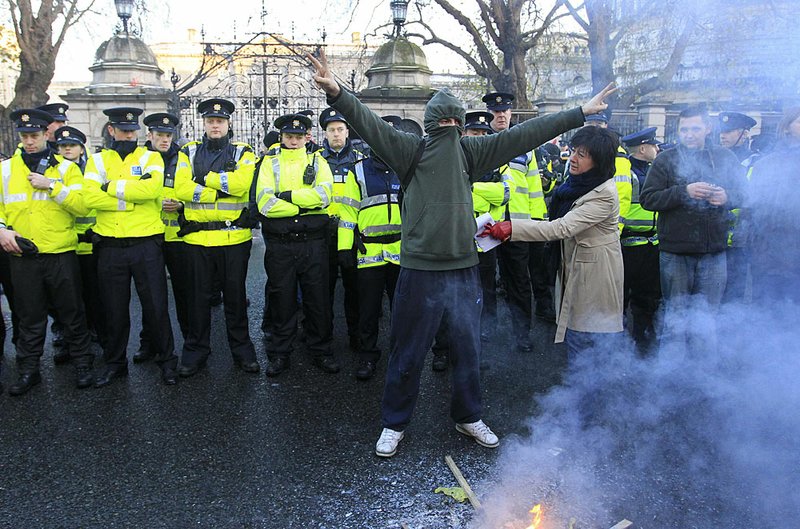DUBLIN, Ireland — An Irish government minister said Saturday that he expects an agreement within the next 24 hours on a European Union-International Monetary Fund bailout loan for Ireland worth about $115 billion - but rejected reports that the aid could come with a punitively high interest rate.
Communications Minister Eamon Ryan said all sides in the financial-rescue talks in Dublin want at least “an outline agreement” before markets open Monday. Ireland has been priced out of bond markets and needs a loan to cover coming deficits and to fund its cash-strapped banks.
European Union diplomats confirmed that the finance ministers of the 16-nation eurozone, which includes Ireland,would discuss the emerging EU-IMF loan for the Irish at a hastily arranged meeting in Brussels today.
EU spokesman Bernard Bulcke said finance ministers from the 11 other EU members - including Britain, Denmark and Sweden, which have pledged their own bilateral loans to Dublin - would join the Brussels meeting later today in a sign that a more comprehensive negotiated deal could be on the table.
Speaking to RTE radio, Ryan rejected reports by Ireland’s national broadcaster that at least part of the bailout would come with an interest rate of 6.7 percent.
http://hosted.ap.or…">Greece economy at a glance
“I think that figure was inaccurate. And it was unfortunate because it did scare a hell of a lot of people,” Ryan said.
He declined to speculate what the average interest rate would be, but said it would be nearer the 5.2 percent average being paid by Greece for its $150 billion EU-IMF bailout in May.
Ryan said whatever terms were agreed “have to make sense for us, so that we’re able to pay it back.”
A second government minister, Noel Dempsey, sounded less confident of any announcement today.
“Our mandate is to get the very best deal, one that will allow us to get out of the present situation,” said Dempsey, the transport minister. “It’s more important to get it right than to get it quick. ... Let’s just wait and see what the deal is.”
His comments came as more than 15,000 people marched to Dublin’s main thoroughfare to denounce the imminent bailout.
The protest, organized by the Irish Congress of Trade Unions, also highlighted fears that Ireland’s next emergency budget could drive thousands into poverty or bankruptcy. The 2011 budget being unveiled Dec. 7 includes $4.5 billion in cuts and $1.5 billion in new taxes - the fourth emergency budget in three years designed to reverse Ireland’s runaway deficits.
It was the first significant march since the IMF and European banking experts descended on Dublin a little more than a week ago, butthe turnout was much less than the 50,000 the police expected.
The leftist protesters - led by speakers and entertainers on a podium in front of the General Post Office, headquarters of Ireland’s 1916 rebellion against British rule - called for Ireland to default on its debts to international banks, like Iceland and Argentina have done.
The main rally dispersed, but a few hundred demonstrators crossed the River Liffey to the government complex housing Dail Eireann, Ireland’s parliament, and the offices of Prime Minister Brian Cowen.
Protesters covering their faces with scarves and caps hurled bottles, firecrackers and eggs at police lines and burned several placards on the pavement. Police largely stood their ground, but charged in to arrest one man seen throwing firecrackers. The protesters dispersed and no serious injuries were reported.
Elsewhere on Saturday, Germany’s finance ministry said it is not considering issuing eurozone bonds to counter Europe’s current debt crisis.
The ministry said Saturday that Chancellor Angela Merkel had previously ruled out such an idea, and “there are no such considerations at the finance ministry.”
The German weekly magazine Focus cited an unnamed official saying Germany might drop its objections to such bonds in return for tougher sanctions on countries running excessive deficits.
Information for this article was contributed by Peter Morrison and Robert Wielaard of The Associated Press.
Front Section, Pages 13 on 11/28/2010
